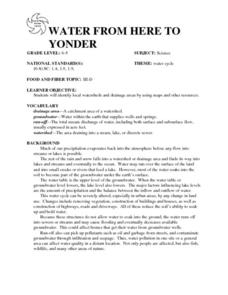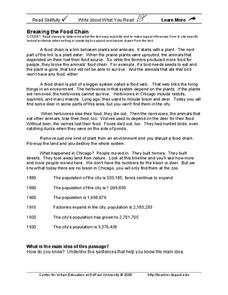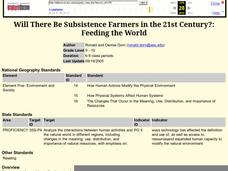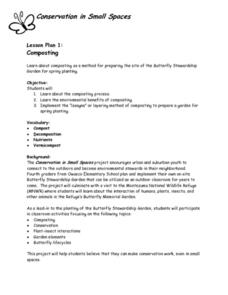Curated OER
Frogs: Fact or Folklore
Students discover how frogs are adapted to their environment. They view and discuss a Discovery Channel video on frogs and the myths surrounding frogs. In small, groups they compile data on frogs from the internet to create a Frog Fact...
Curated OER
WATER FROM HERE TO YONDER
Learners identify local watersheds and drainage areas by using maps and other resources. They are given copies of the water cycle. Students discuss the movement of water in the environment. They observe, record and transfer information...
DePaul University
Breaking the Food Chain
Throughout history, the growth of big cities has resulted in the destruction of ecosystems. In the case of Chicago, IL, a grassland that was once home to bison, deer, wolves, and foxes quickly became a booming city of over three million...
Curated OER
Environment: Mock Trial
Students role-play a trial regarding the taking of family property for a new water purification plant. Among the roles are the judge, attorneys, witnesses, plaintiff, mayor, and jury members. Once both sides present their case, the...
Curated OER
Consequences of Garbage
First graders consider the problem of too much garbage in America. In this garbage use lesson, 1st graders discuss ways to decrease garbage in the United States and complete a coloring sheet.
Curated OER
The Wildland/Urban Interface Dilemma
Learners examine all sides of the issues surrounding wildland fire. Groups assume the roles of different people who must decide what to do about a fictitious wildfire. They have a discussion to analyze the issue. A good, real life lesson!
Curated OER
Environment
Students examine the energy saving benefits of trees. They identify ways in which trees reduce air pollution. They also work together to solve problems related to pollution.
Curated OER
Urban Impact on Chollas Creek (California): A Field Study
Students, in groups, take samples from a creek and keep a field journal on their samples. They also perform tests on their samples.
Curated OER
Historical Air Photo Interpretation
High schoolers identify and analyze land use changes over time with historical aerial photographs. They classify different land use into categories.
Curated OER
A world of oil
High schoolers practice in analyzing spatial data in maps and graphic presentations while studying the distribution of fossil fuel resources. They study, analyze, and map the distribution of fossil fuels on blank maps. Students discuss...
Teach Engineering
Designing a Sustainable Guest Village in the Saguaro National Park
Brainstorm ideas to design a sustainable guest village in the Sonoran Desert. The first installment of a nine-part unit teaches young environmental scientists about the basics of the Saguaro National Park and about sustainable design....
Chicago Botanic Garden
Calculating Your Ecological Footprint
You can lower your ecological footprint by recycling! Lesson four in this series of five has individuals, through the use of a computer, calculate their ecological footprints. Through discussions and analysis they determine how many...
California Academy of Science
Our Hungry Planet: Design Thinking Challenge
Scholars investigate an issue associated with food systems and design their own solutions. Working collaboratively, they follow each step in the design process to complete the 10th lesson of the 13-part Our Hungry Planet series.
Chicago Botanic Garden
Introducing Ecosystem Services
Purifying air and water, providing soil in which to grow crops, and moving water through its natural cycle are all services an ecosystem provides that benefit humans. Lesson four in a series lets learners explore and discuss the value of...
Chicago Botanic Garden
Introducing Ecosystem Services
Ecosystems provide many things humans not only use but also need in order to survive. The last lesson in the series of seven introduces scholars to the idea of ecosystem services, that ecosystems provide humans with many things we need....
Curated OER
Will There Be Subsistence Farmers in the 21st Century?: Feeding the World
Students examine the topic of subsistence farming. They research the future of subsistence agriculture, identify the types and locations of subsistence agriculture, and write about subsistence farming in regards to developing nations and...
Curated OER
Conservation in Small Places - Composting
A fabulous lesson introduces the art of composting to your gardeners. In it, youngsters learn about the composting process and how it actually works. They discuss the environmental benefits of composting, and use the "lasagna" method...
University of Wisconsin
Rain Garden Species Selection
The activity really comes to life within its intended unit on starting a rain garden. Working in groups, participants research native plants and coordinate them with the conditions in the designated garden area. Give the class access to...
California Academy of Science
Pollution in Our Watershed
The concept of a how pesticides and other chemicals pass through a watershed can be difficult for younger learners to grasp without a concrete example. In the activity here, some blank paper, markers, and a spray bottle are all you need...
Curated OER
Mobility: A Green City, Past, Present, and Future
Students explore transportation systems through history. In this transportation lesson, students determine how modes of transportation affect quality of life and design transportation plans for cities.
Curated OER
Flowering Phenology: How Do Plants Know When to Flower?
Young scholars study the process of plant reproduction and the biotic and abiotic factors that affect flowering phenology. In this plant reproduction lesson, students describe the interaction of environmental factors as it relates to...
Curated OER
Hands Off
Students perform a handwashing experiment to see if a difference can be detected in the number and types of microbes on our hands after various types of cleaning. They will also demonstrate that they have learned the whys and hows of...
Curated OER
Weather and Seasons: Mt. Seymour Winter Fieldtrip
Students explore winter adaptations and glare. In this winter weather lesson, students discuss the season of winter and how animals and plants adapt to the changing weather. Students discuss the glare off snow and make goggles for their...
Curated OER
Exploring the Neighborhood -- Literature Jigsaw
Students compare and contrast domesticated animals and wild animals. They identify plants and animals that have adapted to different habitats. They discover it is everyone's responsibility to protect the environment.

























